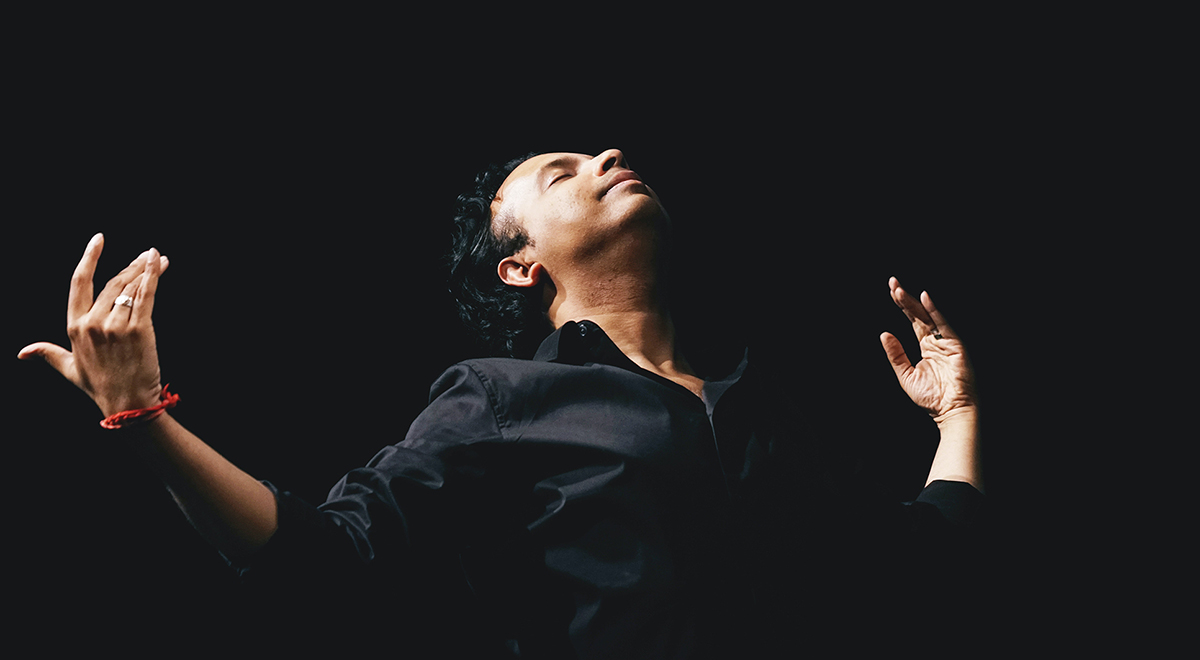Wesleyan Faculty, Alumnus Awarded Guggenheim Fellowships in Choreography, Theatre

A Wesleyan University faculty member and alumnus were two of 188 newly announced Guggenheim Fellows, according to the John Simon Guggenheim Memorial Foundation on April 11.
Hari Krishnan, professor of Dance, Feminist, Gender, and Sexuality Studies, and Global South Asian studies, received a fellowship for his work in choreography. Tavia Nyong’o ’95, William Lampson Professor of Theater and Performance Studies, American Studies, and African American Studies at Yale University, received one for Theatre Arts & Performance Studies.
“It means everything to me. It’s a recognition of the work I do, the breadth of my eclectic choreography for over 30 years,” Krishnan said. “This recognition from Guggenheim is also a recognition for Wesleyan, its amazing dance department and for my work as an educator at this amazing university for the past 24 years. Wesleyan continues to reaffirm, nurture, and nourish who I am as an artist, scholar and as a human.”
Krishnan, who specializes in Bharatanatyam, which is classical dance from South India, Queer Dance and Contemporary Dance from Global Perspectives, will use his fellowship to develop his latest choreographic work “ROWDIES IN LOVE” with his dance company inDANCE. This production, featuring eight male dancers, centers radical love and celebrates a community of individuals who are uninhibited, unhinged, and who refuse to fit into stereotypical boxes stipulated by society at large. Two dancers from the production are Wesleyan alumni who are now working as professional contemporary dancers in New York, Eury German ’16 and Spenser Stroud ’22. “ROWDIES IN LOVE” premieres this fall on campus from Dec. 6-7 at the CFA Theater.
“This fellowship also speaks to the progressive ways Guggenheim recognizes art making in these complex times we live in,” Krishnan said. “Recognizing artists who think outside the box, who are daring, courageous, bold, and have a truly distinct individual point of view.”
“ROWDIES IN LOVE” is supported by a production grant from National Dance Project and was developed as part of a Jacob’s Pillow Lab residency.

Nyong’o researches Black queer cultural and performance studies, contemporary art and aesthetic theory, speculative genres, Afrofuturism, and Black sound studies. He is studying critical negativity in the 21st century.
Nyong’o has written for NPR, The LA Review of Books, n+1, Artforum, and is on the editorial boards of TDR: A Journal of Performance Studies, Theatre, and Contemporary Theatre Review. His first book, The Amalgamation Waltz: Race, Performance, and the Ruses of Memory (2009), won the Errol Hill award for the best book in Black theater and performance studies. His second book, Afro-Fabulations: The Queer Drama of Black Life (2018), won the Barnard Hewitt award for best book in theater and performance studies.
“Through a rigorous application and peer process, the Guggenheim Foundation chose the Class of 2024 Guggenheim Fellows from a pool of almost 3,000 applicants because of their prior career achievement and exceptional promise. As established in 1925 by founder Senator Simon Guggenheim, each fellow will receive a monetary stipend to pursue independent work at the highest level under “the freest possible conditions.
“Humanity faces some profound existential challenges,” said Edward Hirsch, award-winning poet and president of the John Simon Guggenheim Memorial Foundation. “The Guggenheim Fellowship is a life-changing recognition. It’s a celebrated investment into the lives and careers of distinguished artists, scholars, scientists, writers and other cultural visionaries who are meeting these challenges head-on and generating new possibilities and pathways across the broader culture as they do so.”
The John Simon Guggenheim Memorial Foundation – created and initially funded in 1925 by U.S Senator Simon and Olga Guggenheim in memory of their son John Simon – has sought to “further the development of scholars and artists by assisting them to engage in research in any field of knowledge and creation in any of the arts, under the freest possible conditions.”
Since its establishment, the Foundation has granted over $400 million in Fellowships to more than 19,000 people, including more than 125 Nobel laureates, members of all the national academies, winners of the Pulitzer Prize, Fields Medal, Turing Award, Bancroft Prize, National Book Award, and other internationally recognized honors. The broad range of fields of study is unique to the Fellowship program.
According to a press release, “The Foundation centers the talents and instincts of the Fellows, whose passions often have broad and immediate social impact. For example, in 1936, Zora Neale Hurston wrote Their Eyes Were Watching God with the support of a Guggenheim Fellowship and dedicated it to the Foundation’s first president, Henry Allen Moe. Photographer Robert Frank’s seminal book, The Americans, was the product of a cross-country tour supported by two Guggenheim Fellowships. The accomplishments of other early Fellows like e.e. cummings, Jennifer Doudna, Jacob Lawrence, Rachel Carson, James Baldwin, Martha Graham, and Linus Pauling also demonstrate the strength of the Foundation’s core values and the power and impact of its approach.”

